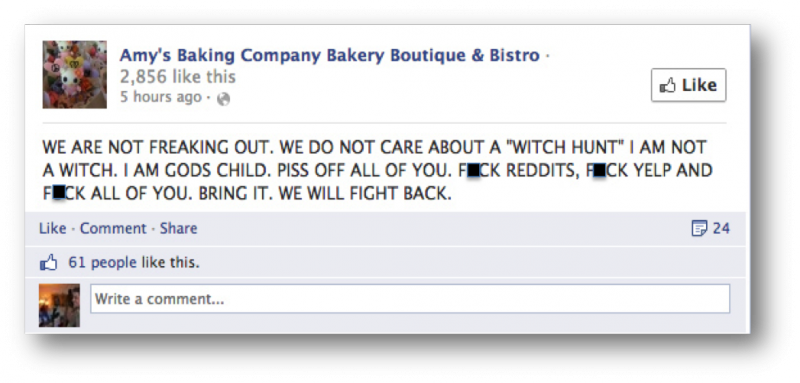Amy’s Baking Company Social Media Meltdown: The ABCs Of Social Media
Of the many questions I get from clients, many center on the use of social media for customer engagement purposes — because sometimes IT staff are asked to block employees from using social media. But what should you do when the owners of the business take to social media?
Today, a small restaurant in Arizona is the hottest thing on social media. Their Facebook page has gone from 2,854 likes on May 14 to 74,687 on May 16. Was this incredible growth in “likes” the result of some incredibly successful social media campaign? Well not exactly.
The restaurant was recently featured on the season finale of Ramsey’s Kitchen Nightmares — a show my wife and I really enjoy as it happens. It seems the main reason why the owners, Amy and Samy Bouzaglo, invited the show to their restaurant was because business had gone downhill because of an Internet firestorm they themselves seemed to have not only started but also steadily fuelled.
Well one of the many, many lessons from the meltdown of Amy’s Baking Company (ABC) in Scottsdale, AZ is that owners should never try to use social media before understanding a few basic guidelines:
- Don’t go on the defensive by insulting customers on social media. The ABC fiasco all started when one customer posted a negative review on Yelp. Amy posted a vitriolic response … and everything else snowballed from there. It’s much better to acknowledge you heard the criticism —– even if you don’t agree with it — and move on. Moving on for most customer-centric businesses means trying to improve things for the next customer (and possibly making amends with the unhappy customer). But not at ABC.

- Don’t become a “troll” with your detractors. Every company faces some negative criticism. Some companies even deserve it. But the very worst thing you can do is to use vile and vulgar language to defame and insult commenters on social media. In fact social media has a name for people who do this — TROLLS — and everyone learns to ignore trolls. But it seems the owners of ABC, Amy and Samy Bouzaglo, decided the best approach was to become a troll themselves. This is not in my list of recommended approaches to take!

- Don’t make stuff up. Long after they should have walked away from the keyboard Amy and Samy suggested to detractors that the FBI would be investigating everyone who had posted negative comments on social platforms like Yelp and Reddit. Then on Monday night, May 15th they posted that their account had been hacked and none of the nasty things that had been posted were their comments. I’m pretty sure none of the 25,000+ people who commented were buying the story. (See figure)
- Know when to walk away. I hate to say it but you just have to know when it’s time to stop. In the case of ABC that was probably two and a half years ago. But if you own your Facebook page you need to know how to use it. Taking down a FB page which has 74,000 likes is not something you want to consider, but if all the people who liked your page did so because they just want to watch the train wreck, you need to consider drastic action. Of course in the case of ABC the downside of doing anything short of shutting up shop and re-branding is that the so-called “haters” on social media will find a way to get to you.
- Engage a PR firm early. PR firms can do wonderful things to help you manage your social media image, but they are not miracle workers. Samy and Amy hired a local PR firm yesterday after the firm went on a radio show saying ABC was beyond help (listen to the show). The latest post on the ABC Facebook page suggests they are trying to do a PR makeover. Unfortunately the inept post only served to inflame people more.
There are so many lessons from the ABC meltdown that it deserves a book. One big lesson for every business owner is that social media will always expose poor customer experiences. Unless you are willing to re-engineer your failing customer experiences, your business will fail. And in the case of ABC, it’s less a case of re-engineering, and more treating customers and staff with respect and being willing to accept that a Michelin Star Chef may know a thing or two more about running a restaurant than you do.
(AND DON’T STEAL YOUR WAIT STAFF’S TIPS!)
Next post: How To Retain Your Most Creative Employees
Previous post: Winning The Customer Experience Game (Part 2)